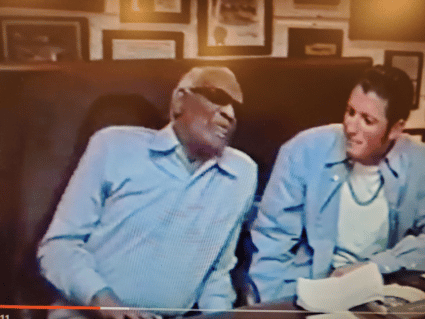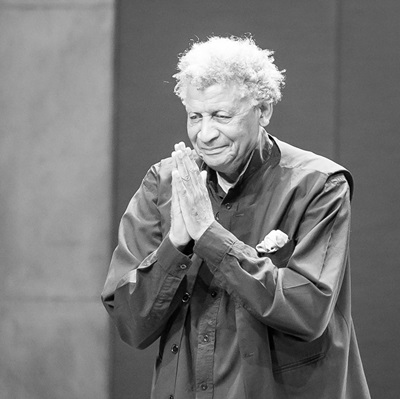.
.
photo courtesy Alan Swyer

Ray Charles being interviewed by Jonas Swyer; Spring, 2000
.
.
___
.
.
…..For several years, Ray Charles and I had a running joke. In the midst of a conversation about some other topic, he would suddenly shift gears and try to put me on the spot. “How come you never ask for shit?” he would ask.
…..“What could I possibly want?” I would reply.
…..“How about CD’s?”
…..“Who do you think wrote introduction for a bunch of reissues?” I would counter. “And was a producer on the Love Songs compilation.”
…..“What about tickets?”
…..“To see you playing with a bunch of guys reading music?”
…..Invariably, Ray would sigh. “One of these days you gotta ask.”
…..That happened on a February morning when I placed a call to him. “I’m asking,” I said.
…..My older son, who at that point was a senior in high school, was taking a course on the Sixties, for which each student had to do a project about someone meaningful in that decade. Not eager to do a research paper, Jonas asked me what he could do that might be more fun, interesting, and lively. When I suggested that he interview someone he’d gotten to know through me, he immediately asked if it could be Ray.
…..Once I explained the situation to Ray, he playfully protested. “I wasn’t just important in the Sixties.”
…..“But you were important then.”
…..“Okay,” said Ray. “But I’m doing it for him, not just for his dad.”
…..“And if I film it?”
…..“Don’t fuck it up!” replied Ray with his inimitable cackle. “Just tell me when.”
.
…..My friendship with Ray began when I was approached about writing something about him. Though both flattered and thrilled, I nevertheless insisted on two conditions. First, I wanted to be able to tell the truth. Second, I wanted serious access to Ray. That led to two lengthy meetings with his manager, Joe Adams, who vetted and grilled me before setting up a face-to-face with the man I’d longed hope to meet.
…..“I hear you know your shit,” Ray said once the two of us were alone. “Name three acts no one wanted to follow way back when.”
…..“Guitar Slim,” I began.
…..“Bopping through the audience with that giant cord,” said Ray approvingly. “Who else?”
…..“Joe Tex.”
…..“With those microphone tricks James Brown and everybody copped from him,” acknowledged Ray. “And third?”
…..“A dancing bear.”
…..A look of disbelief spread on Ray’s face, then he started laughing so hard he nearly fell out of his chair.
…..“We’re gonna get on fine,” Ray announced.
.
…..We got on better than fine. In addition to responding to questions about both his life and his work, Ray was always curious to know what I was hearing from others – past and present – who had been part of his life. He was amazed I’d tracked down Gosady McGee, the guitarist in his first group, the Maxim Trio, who wound up marrying Mama from “Amos & Andy.” He was stunned that I’d found Alexandra Brown, whose first gig as a Raelette was at a benefit concert for Martin Luther King that yielded a face-off between the National Guard and the KKK. And he was delighted to learn I’d spent time with Sid Feller, who produced Ray’s duet album with Betty Carter.
…..Though Ray and I had reached the point where we could joke with each other and do some teasing, in truth we were what I would call friendly, without quite being friends. That changed, however, when Ray mentioned hearing that my wife was a good cook. “Not good,” I corrected. “Excellent.”
…..“So how come you never invite me?”
…..Immediately a dinner was scheduled. But the night before, he called to say that his one remaining “Auntie” was ill, so he was getting on a plane for Florida.
…..Upon his return, a second date was chosen. But that, too, was scratched when Ray announced apologetically that he had a conflict.
…..“You know baseball,” I told Ray once a third date was selected. “Three strikes and you’re out.”
…..“Hell or high water, I’ll be there,” Ray assured me.
…..Still, when the big day arrived, I received an early call from Joe Adams. “Just want to let you know,” he stated, “Ray won’t be there this evening.”
…..“Are you calling on Ray’s behalf?” I inquired. “Or to warn me?”
…..“I’m saying he’ll find an excuse.”
…..“Why would he do that?”
…..“Because he doesn’t eat in public.”
…..“But we’re not public. Want to bet he’ll come?”
…..“How much?”
…..“Lunch anywhere in town.”
…..“Dinner, motherfucker,” said Joe gleefully. “An expensive one, with our wives.”
…..Hanging up, I promptly called Ray. “Joe Adams says you won’t be showing up tonight.”
…..“Fuck him!” shouted Ray.
…..After we discussed a menu, I asked Ray what he’d like to drink. “Now you’re in trouble,” Ray said with a laugh. “Dom Perignon.”
…..I brought home a magnum, which Ray proudly opened.
…..“To good friends?” he asked while raising his glass to toast.
…..“And two birthdays!” I added, pointing out that it was September 24th, the day after Ray’s birthday, and two days before my son’s.
…..“Let’s make this a tradition,” Ray insisted
…..That’s what it became.
.
…..I sent a one-word email to Ray two days after our conversation about the proposed interview: “When.”
…..I I immediately received a day and time.
…..Though Jonas was excited, I insisted he calm down. This was something, I explained, that he couldn’t simply wing. Given the number of interviews Ray had been subjected to throughout his career, serious preparation was needed.
…..Together the two of us had several chats. Then, on the designated morning, off we drove to Ray’s office.
…..After hugs were exchanged, Ray put Jonas at ease by saying he had more confidence in him as an interviewer than in me as a cameraman.
…..Ray beamed as Jonas introduced one provocative topic after another. First was the daring that resulted in the breadth of Ray’s musical ambitions: Blues, R&B, Country, Soul, Show Tunes like “Oh! What A Beautiful Morning,” and even “America.” Next, how the man known as “The Genius” came to own his own masters. Then, a series of questions about Ray’s involvement with Martin Luther King.
…..Again and again, Ray offered praise. “Those are some great questions,” he said at one point. “People ask me the same stuff over and over,” he said later, “but you’re making it fun.” Then later he announced, “Gimme some skin!”
…..When one of his staffers opened the door mid-interview, Ray waved her off. “Can’t you see I’m doing something important?” he growled.
…..After more hugs, plus a promise to get together in September for yet another joint birthday dinner, Jonas and I climbed into my car.
…..“That was amazing!” Jonas gushed. “I don’t even know what to compare it to.”
…..“Since you’re a baseball guy,” I said, “you just interviewed Babe Ruth.”
…..Jonas nodded and smiled. “I can’t wait to bring this to school tomorrow.”
…..“You can’t,” I said.
…..“W-why not?” asked Jonas, crestfallen.
…..“Because the teacher will want to keep it. First I’ll make some dubs.”
.
…..In the weeks that followed, I searched for a way to express my gratitude above and beyond simply saying thanks. An opportunity presented itself when I got a call from the promoter of the Chicago Blues Festival.
…..“I’d like to book Ray as the headliner,” Barry Dollens began.
…..“So what’s the problem?”
…..“Can we talk off the record?”
…..When I said yes, he mentioned that as much as he respected Ray, he didn’t want to put him on-stage with a bunch of guys reading music. So, he wanted to know, was there any way to make the evening special?
…..“How about if we reunite him with the guys from the great band who are still active, but not with him?” I suggested.
…..Barry instantly asked who I had in mind, allowing me to name Hank Crawford, David “Fathead” Newman, Leroy Cooper, Marcus Belgrave, and Phil Guilbeau.
…..“Great idea!” gushed Barry. “How can I get ’em?”
…..“I’ll help,” I said, “if you’ll pay them real money.”
.
…..Thrilled, Ray insisted that I fly to Chicago on the redeye with him and Joe Adams. Dumping our bags at two different hotels – I chose to stay at the same place as the musicians and Raelettes rather than with Ray and Joe – we drove to the festival site for a run-through.
…..People walking through the park that morning got to hear the greatest Ray Charles performance in ages. Then I got a hoot of joy from Ray when, midway through the rehearsal, I surprised him by having my friend Mable John, who had once been the lead Raelette, join the current version.
…..Though excellent, the evening show lacked a little of the freshness of the run-through, compounded by the fact that some old grudges started resurfacing.
.
…..Sadly, the joint birthday celebrations came to an end when Ray got sick. Though he told me that he would bounce back, just as he’d overcome adversity in the past, that was not the case.
…..Not long after, our wonderful times together came to a definitive end. My wife, son, and I were flattered to be invited to Ray’s funeral, which, amidst the sadness, featured moving performances by B.B. King, Willie Nelson, and Stevie Wonder.
.
…..Though we cherished the memories, plus of course Ray’s music, the interview my son did with Ray inevitably was largely forgotten over the decades that followed. That changed twenty-two years later when, over lunch with the curator of the Rock & Roll Hall of Fame, I was asked if I had something that could be used in an exhibit about Ray that was in preparation.
…..A search party yielded the one remaining DVD, which proved that despite Ray’s teasing, I hadn’t botched the camerawork.
…..Best of all, beyond being wonderfully informative, it was imbued with a warmth toward my son that Ray rarely ever displayed in public.
.
.
___
.
.
Alan Swyer is an award-winning filmmaker whose recent documentaries have dealt with Eastern spirituality in the Western world, the criminal justice system, diabetes, boxing, and singer Billy Vera. In the realm of music, among his productions is an album of Ray Charles love songs. His novel ‘The Beard’ was recently published by Harvard Square Editions.
.
.
Listen to the 1958 recording of Ray Charles performing “Tell Me How Do You Feel” [Rhino/Atlantic]
.
.
___
.
.
Click here to learn how to submit your own True Jazz Story
Click here to subscribe to the Jerry Jazz Musician newsletter
.
.
.












































One comments on ““Memories of Ray” — a true jazz story by Alan Swyer”